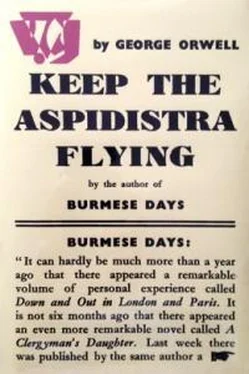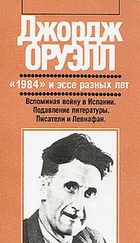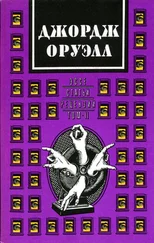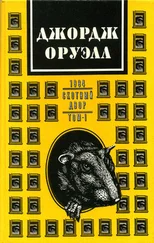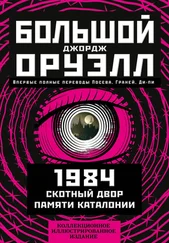'Have you got any Asti?' he said to the waiter.
The waiter suddenly beamed, thinking of his corkage. He had grasped now that Gordon and not Ravelston was the host. He answered in the peculiar mixture of French and English which he affected.
'Asti, sir? Yes, sir. Very nice Asti! Asti Spumanti. Tres fin! Tres vif!'
Ravelston's worried eye sought Gordon's across the table. You can't afford it! his eye pleaded.
'Is that one of those fizzy wines?' said Rosemary.
'Very fizzy, madame. Very lively wine. Tres vif! Pop!' His fat hands made a gesture, picturing cascades of foam.
'Asti,' said Gordon, before Rosemary could stop him
Ravelston looked miserable. He knew that Asti would cost Gordon ten or fifteen shillings a bottle. Gordon pretended not to notice. He began talking about Stendhal—association with Duchesse de Sanseverina and her 'force vin d'Asti'. Along came the Asti in a pail of ice—a mistake, that, as Ravelston could have told Gordon. Out came the cork. Pop! The wild wine foamed into the wide flat glasses. Mysteriously the atmosphere of the table changed. Something had happened to all three of them. Even before it was drunk the wine had worked its magic. Rosemary had lost her nervousness, Ravelston his worried preoccupation with the expense, Gordon his defiant resolve to be extravagant. They were eating anchovies and bread and butter, fried sole, roast pheasant with bread sauce and chipped potatoes; but principally they were drinking and talking. And how brilliantly they were talking—or so it seemed to them, anyway! They talked about the bloodiness of modern life and the bloodiness of modern books. What else is there to talk about nowadays? As usual (but, oh! how differently, now that there was money in his pocket and he didn't really believe what he was saying) Gordon descanted on the deadness, the dreadfulness of the age we live in. French letters and machine– guns! The movies and the Daily Mail! It was a bone–deep truth when he walked the streets with a couple of coppers in his pocket; but it was a joke at this moment. It was great fun—it IS fun when you have good food and good wine inside you—to demonstrate that we live in a dead and rotting world. He was being witty at the expense of the modern literature; they were all being witty. With the fine scorn of the unpublished Gordon knocked down reputation after reputation. Shaw, Yeats, Eliot, Joyce, Huxley, Lewis, Hemingway—each with a careless phrase or two was shovelled into the dustbin. What fun it all was, if only it could last! And of course, at this particular moment, Gordon believed that it COULD last. Of the first bottle of Asti, Gordon drank three glasses, Ravelston two, and Rosemary one. Gordon became aware that a girl at the table opposite was watching him. A tall elegant girl with a shell–pink skin and wonderful, almond–shaped eyes. Rich, obviously; one of the moneyed intelligentsia. She thought him interesting—was wondering who he was. Gordon found himself manufacturing special witticisms for her benefit. And he WAS being witty, there was no doubt about that. That too was money. Money greasing the wheels— wheels of thought as well as wheels of taxis.
But somehow the second bottle of Asti was not such a success as the first. To begin with there was uncomfortableness over its ordering. Gordon beckoned to the waiter.
'Have you got another bottle of this?'
The waiter beamed fatly. 'Yes, sir! Mais certainement, monsieur!'
Rosemary frowned and tapped Gordon's foot under the table. 'No, Gordon, NO! You're not to.'
'Not to what?'
'Order another bottle. We don't want it.'
'Oh, bosh! Get another bottle, waiter.'
'Yes, sir.'
Ravelston rubbed his nose. With eyes too guilty to meet Gordon's he looked at his wine glass. 'Look here, Gordon. Let ME stand this bottle. I'd like to.'
'Bosh!' repeated Gordon.
'Get half a bottle, then,' said Rosemary.
'A whole bottle, waiter,' said Gordon.
After that nothing was the same. They still talked, laughed, argued, but things were not the same. The elegant girl at the table opposite had ceased watching Gordon. Somehow, Gordon wasn't being witty any longer. It is almost always a mistake to order a second bottle. It is like bathing for a second time on a summer day. However warm the day is, however much you have enjoyed your first bathe, you are always sorry for it if you go in a second time. The magic had departed from the wine. It seemed to foam and sparkle less, it was merely a clogging sourish liquid which you gulped down half in disgust and half in hopes of getting drunk quicker. Gordon was now definitely though secretly drunk. One half of him was drunk and the other half sober. He was beginning to have that peculiar blurred feeling, as though your features had swollen and your fingers grown thicker, which you have in the second stage of drunkenness. But the sober half of him was still in command to outward appearance, anyway. The conversation grew more and more tedious. Gordon and Ravelston talked in the detached uncomfortable manner of people who have had a little scene and are not going to admit it. They talked about Shakespeare. The conversation tailed off into a long discussion about the meaning of Hamlet. It was very dull. Rosemary stifled a yawn. While Gordon's sober half talked, his drunken half stood aside and listened. Drunken half was very angry. They'd spoiled his evening, damn them! with their arguing about that second bottle. All he wanted now was to be properly drunk and have done with it. Of the six glasses in the second bottle he drank four—for Rosemary refused more wine. But you couldn't do much on this weak stuff. Drunken half clamoured for more drink, and more, and more. Beer by the quart and the bucket! A real good rousing drink! And by God! he was going to have it later on. He thought of the five pound note stowed away in his inner pocket. He still had that to blow, anyway.
The musical clock that was concealed somewhere in Modigliani's interior struck ten.
'Shall we shove off?' said Gordon.
Ravelston's eyes looked pleadingly, guiltily across the table. Let me share the bill! his eyes said. Gordon ignored him.
'I vote we go to the Cafe Imperial,' he said.
The bill failed to sober him. A little over two quid for the dinner, thirty bob for the wine. He did not let the others see the bill, of course, but they saw him paying. He threw four pound notes on to the waiter's salver and said casually, 'Keep the change.' That left him with about ten bob besides the fiver. Ravelston was helping Rosemary on with her coat; as she saw Gordon throw notes to the waiter her lips parted in dismay. She had had no idea that the dinner was going to cost anything like four pounds. It horrified her to see him throwing money about like that. Ravelston looked gloomy and disapproving. Gordon damned their eyes again. Why did they have to keep on worrying? He could afford it, couldn't he? He still had that fiver. But by God, it wouldn't be his fault if he got home with a penny left!
But outwardly he was quite sober, and much more subdued than he had been half an hour ago. 'We'd better have a taxi to the Cafe Imperial,' he said.
'Oh, let's walk!' said Rosemary. 'It's only a step.'
'No, we'll have a taxi.'
They got into the taxi and were driven away, Gordon sitting next to Rosemary. He had half a mind to put his arm round her, in spite of Ravelston's presence. But at that moment a swirl of cold night air came in at the window and blew against Gordon's forehead. It gave him a shock. It was like one of those moments in the night when suddenly from deep sleep you are broad awake and full of some dreadful realization—as that you are doomed to die, for instance, or that your life is a failure. For perhaps a minute he was cold sober. He knew all about himself and the awful folly he was committing—knew that he had squandered five pounds on utter foolishness and was now going to squander the other five that belonged to Julia. He had a fleeting but terribly vivid vision of Julia, with her thin face and her greying hair, in the cold of her dismal bed–sitting room. Poor, good Julia! Julia who had been sacrificed to him all her life, from whom he had borrowed pound after pound after pound; and now he hadn't even the decency to keep her five intact! He recoiled from the thought; he fled back into his drunkenness as into a refuge. Quick, quick, we're getting sober! Booze, more booze! Recapture that first fine careless rapture! Outside, the multi–coloured window of an Italian grocery, still open, swam towards them. He tapped sharply on the glass. The taxi drew up. Gordon began to climb out across Rosemary's knees.
Читать дальше
